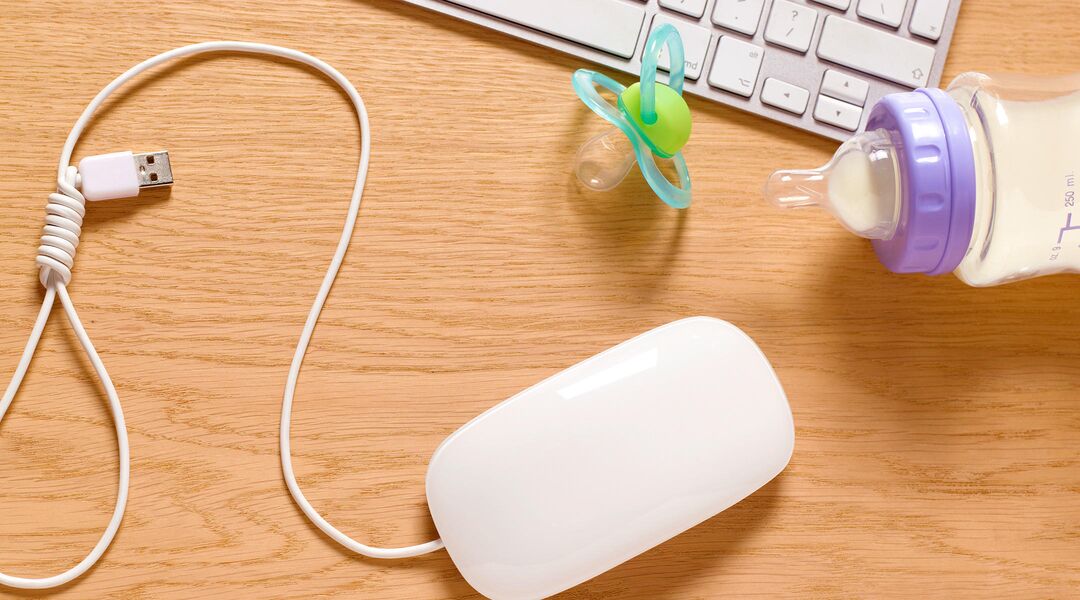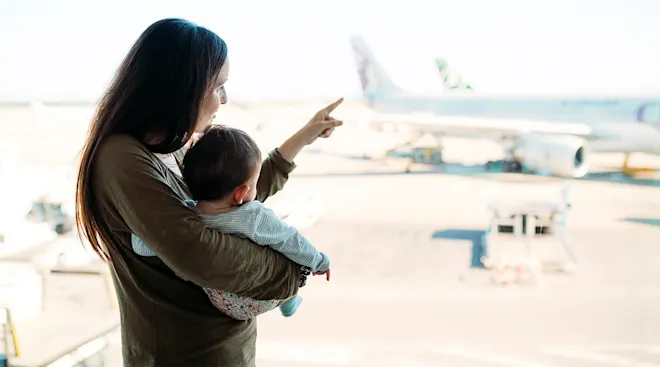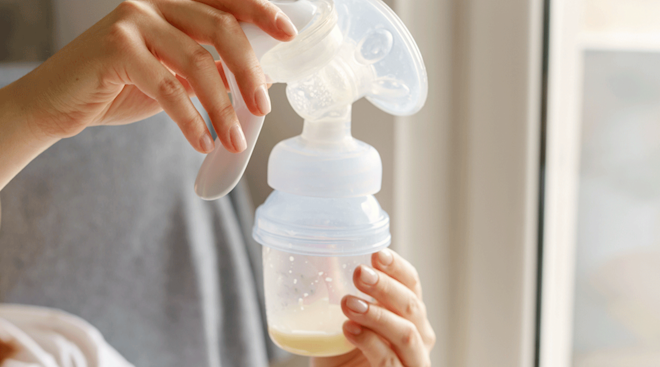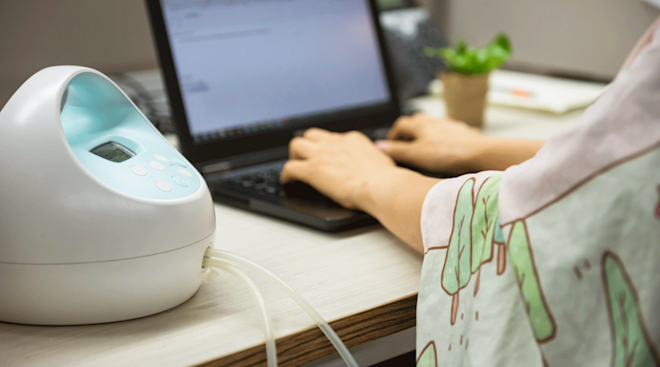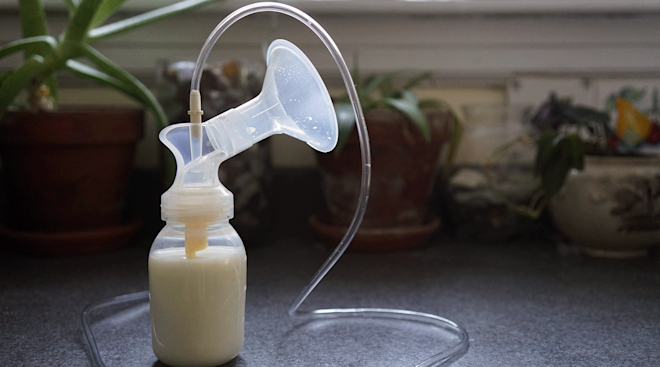Moms’ Tips for Breastfeeding When You’re Back to Work
You know you’ve got to go back to work—and you know you want to keep breastfeeding baby. But how are you going to actually pull it off? A traveling sales rep, a teacher, a surgeon and others share their secrets for breastfeeding (and pumping!) on the job.
Get a really, really good pump
As tempting as it is to get that single, manual pump because it’s super affordable, you really will make your day-to-day five thousand times easier if you get a double, electric pump. It’s simply more efficient than a single pump or a hand pump, which means you’ll get more work done during the day (and get home to your baby faster).
“I had a Medela Freestyle pump and could take it anywhere and wasn’t dependent on power to be able to pump because it comes with a battery pack,” says Lennox M., a physician in Roanoke, Virginia.
“Rent a pump from the hospital,” recommends April, a teacher in Atlanta. “They are the best, the fastest and easiest to work with. If something goes wrong, you can exchange it for another.”
Fight for your rights
Legally, you probably have the right to pump at work. Section 7 of the Fair Labor Standards Act gives an employee the right to reasonable break time to express milk for baby’s first year—and a private place to do it that isn’t a bathroom. Thing is, this right doesn’t apply at companies with fewer than 50 employees.
And not all bosses may realize what the rights are, so you might still have to fight a little for a good place to pump. You definitely should.
“With my first baby, I pumped in empty offices, leaning my back against the door, hoping my colleagues wouldn’t bust through the unlocked door,” says Kelly W., a microbiologist and doula. “The next time [I had a baby], I went to the VP with a proposal about why moms who pump are more productive and happier. I asked for some money and space to set up a lactation room. It worked. I bought a massage chair, a refrigerator and some nice decor for the little spot awarded to me.”
Afraid to say something? You may be surprised how supportive your company may be. “I’m a police dispatcher, and work was very supportive!” says Kimberli S.
“At first it felt awkward to tell people what I was doing and why I needed time,” says Kelly K., a surgeon. “Once I got over my initial embarrassment, everything has been so much easier. My male colleagues are actually just as helpful and accommodating as my female ones.”
Band together
What’s even more effective is if you band together with the other breastfeeding moms you work with. “The more of us that breastfeed, the more and better the situations we’ll have at work and school,” says Gretchen D., who was a law student while she breastfed. Gretchen managed to pump during her 20-minute break between classes — splitting time in a break room with another breastfeeding mom — and make it to class on time.
Get creative
Unfortunately, not everyone is lucky enough to have a private space to pump. Heck, not everyone stays in one place all day long. “Since my job is on the road, finding a place to pump was a daily task,” says Katie S., a pharmaceutical sales rep. “I pumped in the car in parking lots, in clients’ offices and in public bathrooms. I did try it while driving, but it wasn’t very safe!”
“My husband brings my daughter to my workplace some days so I can feed her on my lunch break,” says Melissa B., an emergency room nurse.
“I have to pump in a supply closet and use my lunch and planning breaks, but it is worth it,” says Genevieve M. “I watch videos of my son while I pump to help with letdown and remind me why I do it.”
Look for shortcuts and develop a routine
Once you’re a working mom, you can count your free moments on your…oh let’s face it, there are no free moments to count. So you’ll make yourself less crazy by stocking up on the tools you need to get your pump parts and bottles clean without standing over the sink for long chunks of time.
“I streamlined my process by using [special breast pump] wipes to clean the pump after use,” says Sarah C., a writer and editor in Fairfield County, Connecticut. “Then I could just rinse it quickly.”
“I used a bottle sterilizer for my pump parts, so that helped with efficiency,” says Lennox. We also like those quick microwave sterilizer bags.
Once you’ve got the tools, make sure you’re creating a routine that doesn’t stress you out (at least not too much). “Having my pumping kit clean and ready to go with extra parts made things so much easier,” says Shannon C., a salon owner and nail artist. “I would pump in the morning before I left for work, then grab my bag, which had two sets of flanges, wipes and bags, and go. When I got home that night, I would freeze the milk and wash the flanges to be ready again the next day.”
Schedule pumping sessions into your calendar
Work can get pretty demanding—and distracting—and before you know it, you’ve totally missed a pumping session. This can lead to engorgement in the short run and a diminishing supply in the long run. “I’d set my phone’s alarm during the day to remind myself I had to pump, since I’d get wrapped up in work,” says Katie.
If you’re on Outlook or some other calendar program, it’s important to block out times for pumping. That way, you know you’ve blocked out the time, coworkers know you’re not available, and you’re more likely to stick to the schedule (plus, sticking to a schedule is good for your supply.).
“We are booked so solid [seeing patients] during the day, I have to double book slots so I have a break in between to pump,” says Kelly K. “It takes my paying more attention to my schedule. As for operating room days, for long cases, I book them with one of my partners as an assistant so I can take pump breaks.”
Get a hands-free nursing bra
If your pump doesn’t come with a hands-free kit, you can buy a hands-free nursing bra, which can save you tons of time since you’ll have a greater ability to multitask. “I often took proofs in with me when I pumped and corrected them, so I didn’t have any downtime,” says Sarah. “I also did some [phone] interviews while pumping.”
“I’m sure the transcriptionists were wondering what the ‘wha wha wha’ noise was in the background of my dictations!” jokes Lennox.
Expect a few fiascos before you really get it
We hate to break it to you, but there will probably be some embarrassing moments.
“During my first week back, I remember being in this big project meeting and my mind started drifting to thoughts of my baby,” says Kelly. “Uh-oh. [Milk] soaked right through my shirt….Be prepared with pads in case of leaking.”
“I got walked in on a few times while pumping,” says Cheri, a physician in Twin Falls, Idaho.
“A homeless person came up to the car while I was pumping in it, asking for money!” says Katie.
Forgetting the breast pads, neglecting to lock the door, leaving the pump tubing at home (and running frantically to every drugstore in town on your lunch break trying to find replacement ones) are all rookie mistakes. Don’t freak out if you have a few setbacks like these in the beginning. You’ll get the hang of it eventually, and remembering all the essentials—and doing everything right (well, mostly right)—will become the norm in no time.
“I made a sign for my office door that said, ‘Trust me. You do not want to open this door,’” says Cheri.
Really work at it, and know you’ll be glad you did
Kelly had a 50-mile commute, Shannon would make less money the fewer clients she saw, and Sarah pumped in a photo studio. Chrissy R. is an EMT with a busy schedule and found the time to pump twice a day. Cheri was sleep-deprived because her baby refused to take a bottle and instead wanted to nurse intermittently throughout the night. But they all did it (and say it was worth it). And you totally can too.
Sure it will be tough, but as April points out: “Breastfeeding is the ultimate in learning to manage and juggle, especially when you’re a working mom. That juggling act never stops as your child becomes older. Breastfeeding just turns into something else.”
Please note: The Bump and the materials and information it contains are not intended to, and do not constitute, medical or other health advice or diagnosis and should not be used as such. You should always consult with a qualified physician or health professional about your specific circumstances.
Plus, more from The Bump:
Navigate forward to interact with the calendar and select a date. Press the question mark key to get the keyboard shortcuts for changing dates.
































